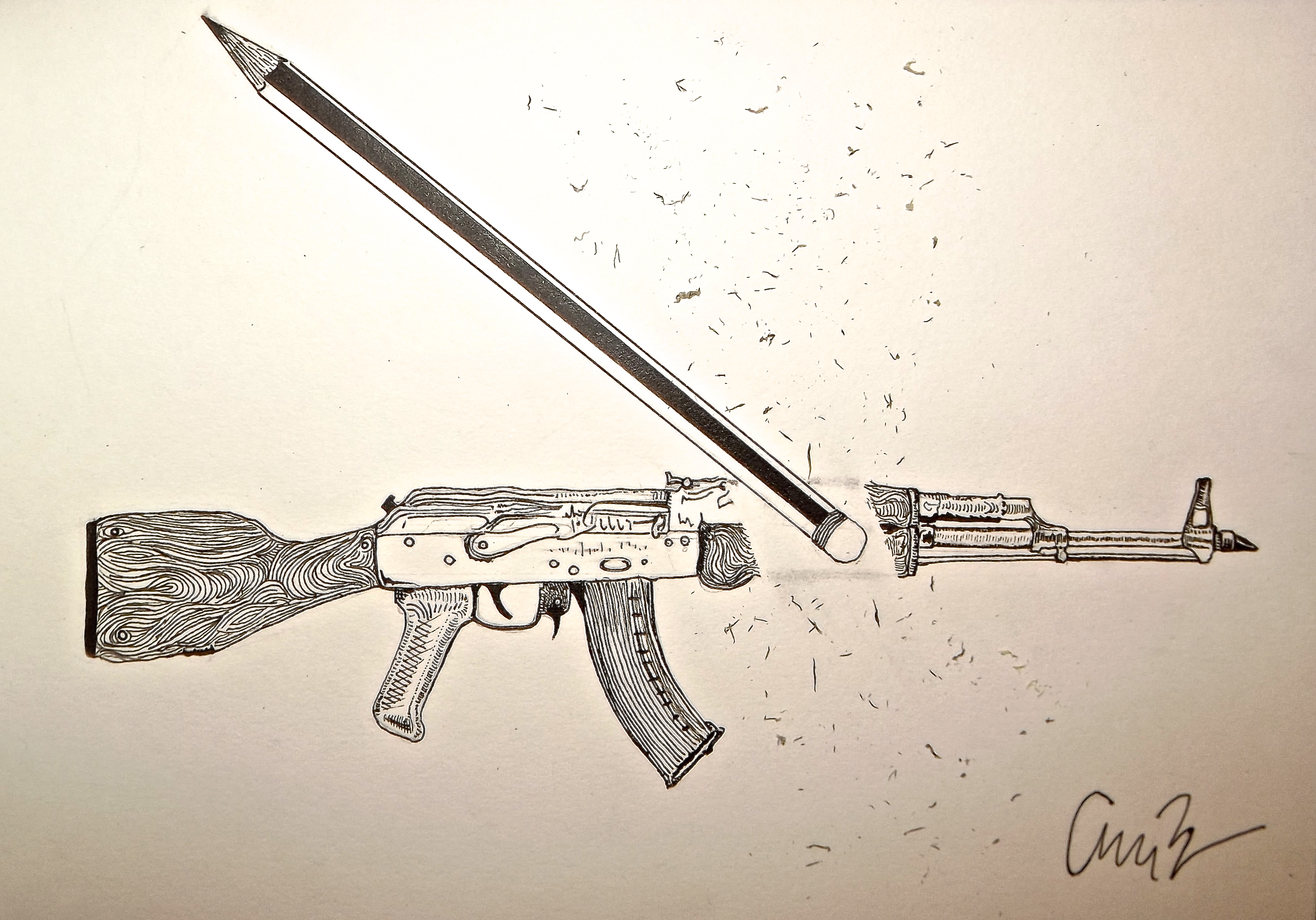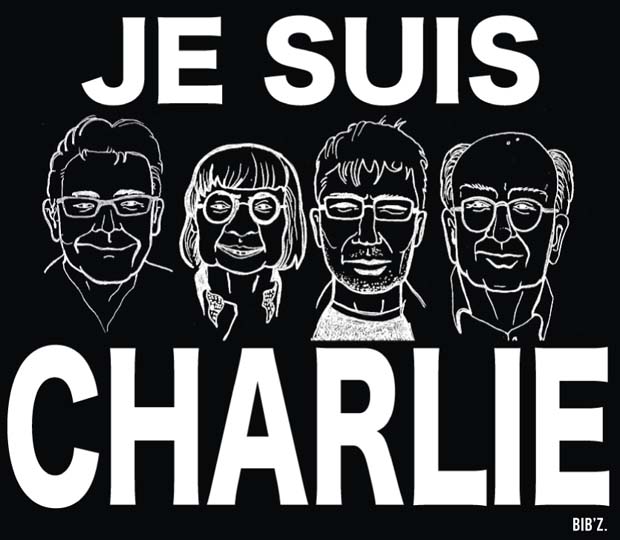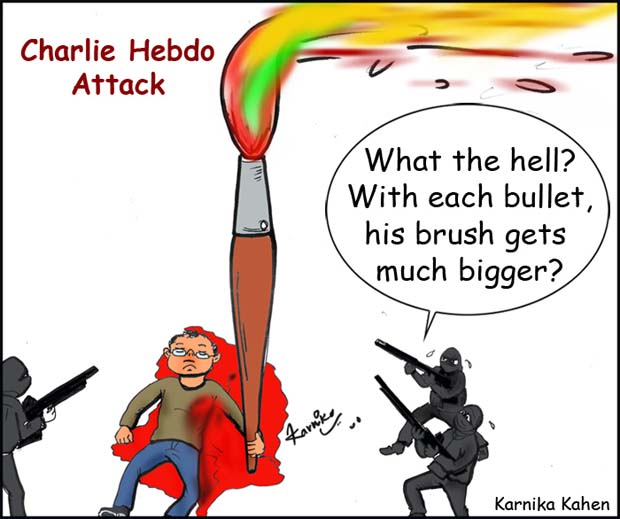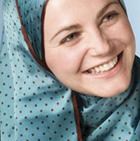7 Jan 2015 | Europe and Central Asia, France, News

Cartoonist Charley-Kai John reflects on the attack.

They Are Charlie: a tribute to cartoonists Bernard Verlhac aka Tignous, Jean Cabut aka Cabu, Stéphane Charbonnier aka Charb and Georges Wolinski by French artist Bib’z.
Armed men attacked the offices of French satirical magazine Charlie Hebdo on Wednesday. They killed two police officers and ten members of the magazine’s staff, including cartoonists Stéphane Charbonnier aka Charb, Jean Cabut aka Cabu, Georges Wolinski and Bernard Verlhac aka Tignous. The magazine has been targeted in the past over its controversial cartoons, including ones featuring the Prophet Mohammed. In 2011, the office was firebombed.
Index has condemned the appalling attack, saying there is nothing that could justify it. “The ability to express ourselves freely is fundamental to a free society. This includes the freedom to publish, to satirise, to joke, to criticise, even when that might cause offence to others. Those who wish to silence free speech must never be allowed to prevail,” added Index CEO Jodie Ginsberg.
Throughout the day, people from across the world have showed solidarity using the hashtag #JeSuisCharlie, while many cartoonists have supported the magazine through their art.
“Cartoonists are among the first people targeted by extremists and fundamentalists for poking fun at the sacred cows of our societies. Humour and satire are tools that close minded extremists have little defence against except by the use of weapons and murder,” Dr. Robert Russell, executive director of Cartoonists Rights Network International said in a statement.

Indian cartoonist Kanika Mishra showing solidarity with Charlie Hebdo
“I feel very sad, horrified and hopeless after hearing this news,” Indian cartoonist Kanika Mishra, who drew the piece above, told Index. “One year ago, I was facing such threats when I made cartoons on [charismatic guru] godman Asaram but I never took those threats seriously. I never knew some blind followers and extremists can go to such extent. Whole world should be united against such horrific attacks on freedom of speech and its high time that we should start talking about a global policy for protecting the rights of every artist in the world.”
Martin Rowson, cartoonist for The Guardian, The Independent and Index among others, added that “we need above all else to laugh these blood-stained clowns back into the dustbin of history, and urgently.”
Below is a selection of the cartoons being shared on social media.
This article was published on 7 January and updated on 8 January 2015 at indexoncensorship.org
7 Dec 2012 | Europe and Central Asia
French satirical weekly Charlie Hebdo is being sued by two Muslim organisations for cartoons it published of the Muslim prophet Muhammad in September. The organisations, Algerian Democratic Rally for Peace and Progress and the United Arab Organisation, are demanding EUR 782,500, accusing the publication of inciting violence and racially-motivated hatred against Muslims. The controversial cartoons were published on the heels of the Innocence of Muslims film which also depicted the prophet, sparking protests from Muslims around the world.
2 Nov 2011 | News
The Charlie Hebdo bombing exposes a gulf in understanding between the secular French establishments and Muslim immigrants, says Myriam Francois-Cerrah

The firebombing of Charlie Hebdo offices following its decision to run an edition featuring the prophet Mohammed as “guest editor”, is a sad reflection of France’s uneasy relationship to Islam and religion more generally.Sadly, there are some who do not believe that Charlie Hebdo should have the right to publish a satirical issue, in which it presents Prophet Mohamed as the inspiration of the Arab revolutions and subsequent rise of islamist parties in the region (regardless of the accuracy of this link!). They are no doubt in a minority, just as those who committed this crime will no doubt be revealed to be a fringe group or renegade individuals.
But there is no denying the fact many Muslims are offended by the decision to run an issue entitled “Charia Hebdo”, with reference to “100 lashings if you don’t die of laughter” (chuckle) and a “halal aperitif” (ha!) and perhaps more pertinently, to run images of Prophet Mohammed.
Charlie Hebdo is renowned for being a highly satirical outlet which pushes the limits of public discourse on any given issue through its provocative illustrations and irreverent style. It has in its time, been accused of being anti-Semitic, anti-Catholic and now Islamophobic to boot and would no doubt parade these accusations as badges of honour.
However the recent issue comes at a complex time in France’s political life. The far right has made large advances, gaining 15 per cent of the vote in recent regional elections and they have maintained the “immigration question” near the top of the political agenda, drawing parallels between Muslims praying in the street and the Nazi occupation. Meanwhile, recent stats suggest that amongst the descendants of immigrants, 70 per cent, compared with 35 per cent amongst recent immigrants, consider that the French government does not respect them, including amongst those possessing university degrees and thus in theory, more “integrated” into the social fabric.
French Arabs face unemployment at a rate of 14 per cent compared with 9.2 per cent amongst people of French origin — even after adjusting for educational qualifications and are poorly represented at every level. Charlie Hebdo’s decision to poke fun at Islam, although completely inline with its treatment of other issues, comes at a time of intense polemics over the place of Islam within France, as debates over “laicite” galvanise the political spectrum.
Many Muslims appear to feel under siege in a political climate which continues to view Islam as an impediment to full adhesion to French national identity and where religious practise is associated with a social malaise. Indeed, a recent report by the French academic Gilles Kepel has reignited debate over the role Islam plays in the perpetuation of disenfranchisement in the suburbs, where Muslims are over-represented.
Some in France have sought to blame Islam for the high levels of unemployment, underachievement, violence and marginalisation in France’s ghettoised suburbs, while others have protested the Islamification of the discourse on the suburbs, decrying the use of confused and loaded terminology to overlook substantial economic and social problems in these areas. In France, with or without the caricatures, Islam is a sore topic with many recent polemics related to Islamic practises, whether the face veil debate, street prayers or the building of new mosques.
French Muslims are regularly told — even by the President — that you either “love France or you leave her”, reinforcing their status as outsiders, and a right-wing discourse which promotes ridiculous predictions of a Muslim take over of Europe through high birth rates and proselytising, is gaining ground. Christopher Caldwell, a contributor to the Financial Times recently published an inflammatory book Reflections on the Revolution In Europe: Immigration, Islam, and the West which has gained widespread media coverage, including on mainstream French TV, with its thesis that Europe is doomed in the face of a Islamic cultural invasion. In this context, marked by fear of Islam’s alleged resurgence, intractability and incompatibility with “French culture”, as well as the inability of many French Muslims to present an alternative perspective on an equal platform, are the seeds of profound social malaise.
Satire of religion has a long history in France and Christians are not exempt from what some groups have deemed insensitive and injurious portrayals of sacred persons or ideas. Since its launch on 20 October, Christian groups have regularly interrupted the Paris based theatrical production of “On the concept of the face of the son of God” (Sur le concept du visage du fils de Dieu) for its perceived blasphemy and “Christianophobia”.
The play features an elderly man defecating on stage and his son coming to clean his back side, using the portrait of Jesus. The excrement collected is then used at the end of the play by children as missiles to be thrown at the portrait of Christ, whilst at the end of the production, a black veil of excrement glides down the portrait of Jesus. In April this year, an art exhibit entitled Piss Christ, featuring a crucifix immersed in a glass containing blood and urine was vandalised by Christians outraged by the piece. Some religious groups have accused the arts and the media to resorting to crass provocations to raise the profile of otherwise mediocre artistic endeavours which might not have garnered public attention without the controversy.
Charlie Hebdo’s current confrontation with Islamic polemics is not its first. In 2008, it won a legal case against accusations of incitement to racial hatred when it chose to reprint the Danish cartoons, launched by the French Muslim Council (CFCM) and the Grand Mosque of Paris. Interviewed on recent events, Mohammed Moussaoui, president of the CFCM has both condemned the attack on Charlie Hebdo and the printing of the irreverent images.
Describing the decision to print images known to be offensive to Muslims as “hurtful” and questioning the association of the caricatures of Prophet Mohamed with events in Tunisia or Libya, he defended the right of those who opposed the decision to protest as well as the freedom of the press to print the said images and explained that in a plural society, people’s relationship to the sacred will necessarily vary.
The attack on the press outlet, Charlie Hebdo is symptomatic of the broader unease French society is facing in light of a growing visible Muslim minority. While successive generations of “French” origin are getting more secular in their outlook, with around 60 per cent of youths saying in 2008 that they had no religious belief, the pattern among the children of immigrants from north Africa, Sahel and Turkey is the opposite, as religion gains in importance, particularly among the young.
How France negotiates an inclusive public sphere in which the views of all its citizens, including those who abide by a religious tradition, are reflected remains a stark challenge. It is telling that Charlie Hebdo chose Mohammed as “guest editor”, rather than a contemporary figure who could express an accurate reflection of French Muslim opinion on current affairs — instead, it chose the route of ease, ascribing archaic and reactionary ideas to a sacred figure, his ideas rigidified and frozen in a literalist caricature, which although undoubtedly humorous in parts, is completely out of sync with how most Muslims understand Islam’s relationship to the modern context. This issue might be its best-selling; the real question though ought to be, is it its best?
Myram Francois-Cerrah is a writer, journalist and budding academic





